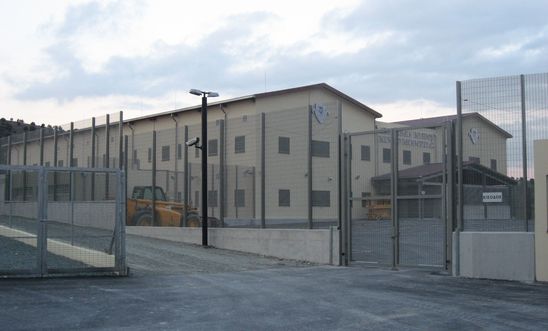
Press releases
Cyprus detaining Syrian refugees in 'prison-like' conditions

Hundreds detained in ‘prison-like’ conditions - with asylum-seekers, including Syrian refugees, among those detained
Cyprus is routinely detaining hundreds of asylum-seekers and migrants in prison-like conditions for lengthy periods, Amnesty International said today, with those detained including Syrian refugees and mothers separated from their young children.
Evidence gathered by Amnesty researchers during a visit to the Menogia detention centre - 13 miles south-west of Larnaca - on 6 March, indicates that the Cypriot authorities are exploiting EU laws by automatically detaining asylum-seekers and migrants without implementing the required safeguards that make detention a last resort - a practice in breach of international law.
During its visit, Amnesty found that nine Syrian refugees were among those detained, at least one of whom had applied for asylum. In at least two separate cases, women detained were forcibly separated from their young children.
Amnesty’s findings come ahead of a protest on Thursday (20 March) at an EU summit in Brussels, with protesters calling on EU governments to protect migrants and refugees along Europe’s shores (see http://goo.gl/cmV8SS).
Amnesty International’s Head of Refugee and Migrants’, Sherif Elsayed Ali, said:“The Menogia centre is a prison in all but name“The Cypriot authorities are detaining Syrian nationals in Menogia when it is Cyprus’ official policy not to return Syrians to Syria. We can only conclude that the detention of Syrian nationals is intended to send a message to other Syrians that they are not welcome in Cyprus.“There can be no excuse for separating a woman who has committed no crime from her children. The treatment of migrants in Cyprus at the moment is degrading and unnecessary.“By detaining scores of people for months at a time, Cyprus is displaying a chilling lack of compassion and a complete disregard for its international obligations.“It is shameful to think that within the EU people who have committed no crime are being held in harsh, prison-like conditions for prolonged periods, in some cases for up to 18 months or longer.”
Case studies of women forcibly separated from their children
Amnesty researchers met two women who had been separated from their children while held in detention. One woman, aged 28, was separated from her 19-month-old infant son whom she was still breastfeeding and detained in a police station after she was arrested while trying to apply for permanent residency. She is married to a Romanian citizen and told Amnesty her immigration status has always been regular and that she did not know the reason for her arrest. Her son was taken away by social services and was only allowed to see her three times a day for 20 minutes for feeding.
A second woman, from Sri Lanka, was detained in Menogia detention centre after visiting her husband, also a Romanian citizen, who was being held at a police station. They were accused of having a marriage of convenience despite a DNA test proving that her husband was the father of her child. She was only allowed to see her three-year-old-son twice a week for half an hour each time.
Both women have since been released after four days and four weeks in detention, respectively.
Conditions in detention
At least one person at the Menogia detention centre, the main immigration detention facility in Cyprus, had been held for 22 consecutive months while awaiting deportation. Under EU law, the maximum detention period on immigration grounds is 18 months. Eight detainees share one room of 18 square metres, with most of the space in the room taken up by four metal bunk-beds. Every night the cells are locked between 10.30pm and 7.30am.
Detention as a means of immigration control should only be used as a last resort, and only after the authorities have demonstrated that it is both necessary and that less restrictive measures are insufficient. In Cyprus it appears to have become standard practice.
Alternative to detention not used
Although Cyprus’ immigration authorities told Amnesty that alternatives to detention are available, Amnesty’s research indicates that these are seldom offered. Instead, deportation orders are issued at the same time as detention orders without considering alternatives, and the Cypriot authorities have admitted to this practice. Alternatives should always be explored before resorting to detention - anyone who is detained for immigration purposes should also undergo a regular and automatic judicial review of their detention.
Since Amnesty last assessed detention conditions of migrants and asylum-seekers in Cyprus in 2011, the only positive development has been that people are no longer held in Nicosia’s central prison.